
History

 |
Newfoundland History |
 |
Claude Bélanger,
[Wherever it is pertinent, links to the Canadian Encyclopedia (Can. Ency), the Dictionary of Canadian Biography (DCB), or to a suitable site (website or a specific title) are made to complete and update the information presented here. The reader is urged to follow these links. The Editor has added to the original text all elements between brackets [...], as well as images and links. Factual mistakes and orthography have been corrected where appropriate. An extensive and rich collection of photos/pictures of Newfoundland from the 1880's may be consulted. The collection is divided into regions: the Avalon peninsula, the Burin peninsula, the Northeast region, and the Labrador area. For the full citation of the source, see the end of the text.]
[Edwards, Richard(b. ?-1773). Naval governor of Newfoundland in 1746. (Newfoundland heritage site)]
Edwards, Richard (d. 1795), was governor of Newfoundland [1757-1759] and 1779-82. He served under Admiral Keppel at Ushant in 1777, and in 1779 was promoted to the rank of rear admiral. He died on February 3, 1795. [website] [DCB]
Elliot, John (d. 1808), admiral, was commander-in-chief and governor of Newfoundland from 1786 to 1789. [website]
[Falkingham, Edward (c. 1683-1757). Naval governor of Newfoundland in 1732. (Newfoundland heritage site)]
Feild, Edward (1801-1876), second Anglican bishop of Newfoundland (1844-76), was born at Worcester on June 7, 1801. He was educated at Rugby and Oxford, where he took first-class honours in mathematics. On May 21, 1826, he was made a deacon, and he served successively as curate at Kedlington, rector of English Bicknor, and inspector of schools in the diocese of Salisbury. In 1844 he became bishop of Newfoundland, and for over thirty years was energetic in the performance of his dudes there. In his mission ship, the Hawk, he fitted up the hold so that it served as a church during his visits to the outports. He extended the work of the Theological College which had been founded by Bishop Spencer, obtained grants for the building of a cathedral which was opened in 1850 in St. John's, established the Church of England orphanage after the choleraepidemic of 1854, established a widows' and orphans' fund in 1858, and in 1870 founded an episcopal endowment fund. In 1875 he moved to Bermuda, which was a part of his diocese, and died there on June 8, 1876. In 1867 he married the widow of the Rev. Jacob Mountain, former principal of the Theological College. See C. H. Mockridge, The bishops of the Church of England in Canada and Newfoundland (Toronto, 1896); H. W. Tucker, Memoir of the life and episcopate of Edward Feild (London, [1879?]). [Brief extract from his 1849 journal] [Charge to the clergy: in 1844, 1847, 1866] [Visit to Labrador in 1848] [DCB] [Can. Ency]
Fleming, Michael Anthony (d. 1850), Roman Catholic bishop of Newfoundland (1829-1850), was consecrated on October 28, 1829, in St. John's. In 1841 he laid the corner stone of the Roman Catholic cathedral, and on January 6, 1850, he conducted the first service in the building. Upon his invitation, schools were founded in St. John's by a community of Presentation nuns in 1833, by the Sisters of Mercy in 1842, and by a Franciscan community in 1846. He died at the Franciscan monastery at Belvedere on July 14, 1850. [DCB] [His role in the Roman Catholic Church of Newfoundland] [Building the Roman Catholic Cathedral] [Religious Orders and education] [picture]
Fraser, Donald Allan (1793-1845), clergyman, was born at Tofosay, Mull, Scotland, on November 24, 1793. He was educated at the University of Edinburgh (M.A.), and in 1818 was sent by the Church of Scotland as a missionary to Pictou County, Nova Scotia. He was called in 1842 to St. John's and was the first Presbyterian minister in Newfoundland. He held services in an old factory and in the Methodist church, until he opened his own church on December 3, 1843. He died on February 7, 1845. In 1814 he married Catherine McLean, daughter of the Laird of Coll, and by her had ten sons and one daughter. See N. S. Fraser and Robert A. Templeton, ThePresbyterian Church in Newfoundland, in J R. Smallwood (ed.), Book of Newfoundland (St. John's, 1937). [DCB]
Fraser, James Oliphant (1826-1904), was born at St. John, New Brunswick, on October 2, 1826, son of Donald Allan Fraser and Catherine McLean. He moved to Newfoundland in 1841 and was employed in various commercial enterprises. He was appointed to the legislative council in 1864, became chairman of the board of works in 1879, surveyor-general in 1882 and postmaster-general in 1885. He died in 1904. He contributed many articles to Newfoundland Quarterly. See D. W. Prowse, The late James Oliphant Fraser (Newfoundland Quarterly, 1904).
Furlong, William Martin (1864-1916), lawyer and politician, was born at Oderin, Newfoundland, in 1864. He was educated at St. Bonaventure's College and served as a teacher at that institution from 1881 to 1884. In 1885 he began the study of law, and was admitted to the bar four years later. From 1893 to 1897, he was a Liberal member of the assembly, for St. John's west. He spent many years preparing the foundation of Newfoundland's argument in the Labrador boundary dispute. He died in February, 1916.
Gambier, James, first Baron (1756-1833), governor of Newfoundland (1802-04), was son of John Gambier, lieutenant-governor of the Bahamas. He took part in the relief of Jersey (1779) and capture of Charleston (1780), was a lord of the admiralty (1795-1801 and 1804-06), led the fleet at the bombardment of Copenhagen (1807), commanded the Channel fleet (1808-11), and in 1830 became admiral of the fleet. [website] [DCB]
[Gargot, Nicolas (1619-1664). Governor of Placentia/Plaisance in 1660. (Newfoundland heritage site)] [DCB]
[Garland, John Bingley (1791-1875). Businessman and First Speaker of the Newfoundland House of Assembly. (Archival Treasures of Memorial University)]
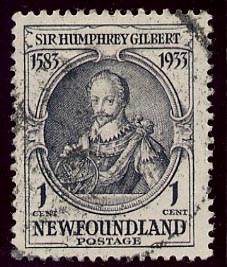 Gilbert,
Sir Humphrey (1539?-1583),
navigator, was step-brother to Sir
Walter Raleigh. In 1578 he received a royal charter for discovery and
plantation, and in 1579 made an unsuccessful voyage towards the west. In 1583
he left Plymouth with five ships, and on August 3 arrived at the harbour of
St.
John's, Newfoundland, which he found occupied by thirty-six fishing vessels
from Portugal, Spain, France and England. On August 5 he formally took possession
of the island in the name of the queen
and himself, thus establishing the first English claim in North America. He
set out on September 1 to return to England, but was lost in a storm off the
Azores. See W. G. Gosling, Life of Sir Humphrey Gilbert, (London, 1911).[Can.
Ency] [DCB]
[Report
of his voyage to Newfoundland from Edward Haies in 1583] [picture]
[Sir
Humphrey Gilbert's Voyage to Newfoundland by Edward Hayes (1910)]
Gilbert,
Sir Humphrey (1539?-1583),
navigator, was step-brother to Sir
Walter Raleigh. In 1578 he received a royal charter for discovery and
plantation, and in 1579 made an unsuccessful voyage towards the west. In 1583
he left Plymouth with five ships, and on August 3 arrived at the harbour of
St.
John's, Newfoundland, which he found occupied by thirty-six fishing vessels
from Portugal, Spain, France and England. On August 5 he formally took possession
of the island in the name of the queen
and himself, thus establishing the first English claim in North America. He
set out on September 1 to return to England, but was lost in a storm off the
Azores. See W. G. Gosling, Life of Sir Humphrey Gilbert, (London, 1911).[Can.
Ency] [DCB]
[Report
of his voyage to Newfoundland from Edward Haies in 1583] [picture]
[Sir
Humphrey Gilbert's Voyage to Newfoundland by Edward Hayes (1910)]
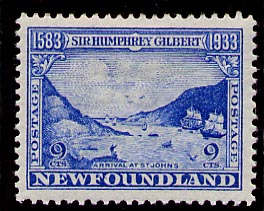
Humphrey Gilbert's fleet navigates the "narrows", entering the port of St.
John's
Glover, Sir John Howley (1829-1885), was twice governor of Newfoundland. He entered the navy in 1841 and distinguished himself as a surveyor, administrator, and commander. He was administrator of Lagos from 1863 to 1864 and 1866 to 1872, and commanded the Houssas in the Ashanti campaign, 1873 to 1874. He was governor of Newfoundland from 1875 to 1881 and from 1883 to 1885, having spent the intervening two years as governor of the Leeward islands. He was created a G.C.M.G. in 1874. [DCB] [website]
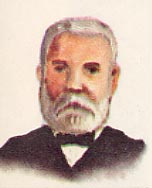 Goodridge, Augustus (1839-1920), merchant and politician, was
born in Paignton, Devonshire, in 1839. He came to Newfoundland in 1852, worked
at his father's business in Renews and later in St.
John's, and eventually became a successful fish merchant. He was elected
to the assembly for Ferryland
in 1880, and for Twillingate
in 1885, as a member of the Conservative party. He was elected again in 1893,
and in the following year became Prime Minister after the resignation of the
Whiteway
ministry, but his government was defeated a few months later. In the election
of 1904 he was a candidate in opposition to Sir
Robert Bond but was defeated. He was appointed by the Morris
government to the legislative council. He died on February 17, 1920. [Can.
Ency]
Goodridge, Augustus (1839-1920), merchant and politician, was
born in Paignton, Devonshire, in 1839. He came to Newfoundland in 1852, worked
at his father's business in Renews and later in St.
John's, and eventually became a successful fish merchant. He was elected
to the assembly for Ferryland
in 1880, and for Twillingate
in 1885, as a member of the Conservative party. He was elected again in 1893,
and in the following year became Prime Minister after the resignation of the
Whiteway
ministry, but his government was defeated a few months later. In the election
of 1904 he was a candidate in opposition to Sir
Robert Bond but was defeated. He was appointed by the Morris
government to the legislative council. He died on February 17, 1920. [Can.
Ency]
[Goodridge, Harold Berwick (1901-1989). Teacher and painter. (Archival treasures of Memorial University)]
Gosling, William Gilbert, (1863-1930), merchant and historian, was born in Bermuda on September 8, 1863, son of Charles Gray Gosling and Elizabeth Gilbert. He was educated at Bermuda University. He came to Newfoundland in 1881, and worked as clerk for a firm which thirty-two years later he directed. He was chairman of the municipal board of St. John's (1914-16) and mayor (1916-19). He was the author of History of Labrador (London, 1910) and The life of Sir Humphrey Gilbert (London, 1911). He died in November, 1930. In 1888 he married Armine, daughter of J. Nutting, Waterloo, Quebec, and by her had two sons and two daughters. His wife presented his library to the city of St. John's to form the nucleus of a public library. [Can. Ency] [Gosling and the establishment of the Child Welfare Association] [Gosling and the Charter of St. John's] [Biography by Melvin Baker] [Short biography as mayor of St. John's]
Gosse, Philip Henry (1810-88), naturalist, was born at Worcester on April 6, 1810, the son of Thomas Gosse, miniature-printer. He had literary ambitions, but in 1827 became apprentice in a whaler's office in Carbonear, Newfoundland. During eight years in Newfoundland he made the first systematic study of local insects, and in 1836 wrote his first work, The entomology of Newfoundland, which still remains unpublished. In 1835 he moved to Compton, [Lower] Canada, farmed for three years, moved to Alabama, and in 1839 returned to England. On the voyage home he wrote Canadian naturalist, which was published the following year. He continued his studies in natural history and was the author of many important works; mainly in the Feild of zoology. He died on August 23, 1888. See Edmund Gosse, Life of Philip Henry Gosse by his son (London, 1890); Mary Q. Innis, PhilipHenry Gosse in Canada (Dalhousie Review, 1937). [Can. Ency] [DCB] [Biography at Wikipedia]
Gower, Sir Erasmus (1742-1814), admiral, was governor of Newfoundland between 1804 and 1807. [DCB] [website]
Graham, George, naval captain, was governor of Newfoundland in 1740.
Graves, Thomas, first Baron (1725?-1802), second son of Admiral Thomas Graves, was governor of Newfoundland from 1761 to 1764. In 1792 he became an admiral, and was raised to the peerage. [DCB] [website]
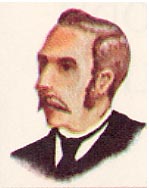 Greene, Daniel Joseph (1850-1911), lawyer, was born at St.
John's, Newfoundland. He was educated at St. Bonaventure's College, St.
John's, and Laval University. He studied law, was called to the bar in
1874, and became Q.C. in 1889. He was elected to the assembly for Ferryland
first in 1875, became leader of the opposition in 1887, and in 1894-95 was
Prime Minister and Attorney general. He married Annie, daughter of James Fox.
[Can.
Ency]
Greene, Daniel Joseph (1850-1911), lawyer, was born at St.
John's, Newfoundland. He was educated at St. Bonaventure's College, St.
John's, and Laval University. He studied law, was called to the bar in
1874, and became Q.C. in 1889. He was elected to the assembly for Ferryland
first in 1875, became leader of the opposition in 1887, and in 1894-95 was
Prime Minister and Attorney general. He married Annie, daughter of James Fox.
[Can.
Ency]
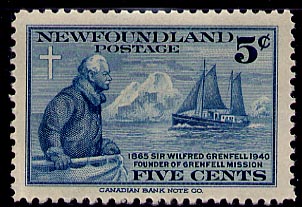 Grenfell, Sir Wilfred Thomason
(1865-1940), medical missionary, author, master mariner, was born on February
28, 1865, at Parkgate, near Chester, England, the son of Algernon Sidney Grenfell
and Jane Georgina Hutchinson. He was educated at Marlborough, Oxford (M.D.),
and London Hospital, and in 1889 joined the Mission to Deep Sea Fishermen.
He fitted out a hospital ship and in it cruised from the Bay of Biscay to
Iceland. He was transferred to Labrador
in 1892 and dedicated the remainder of his life to the welfare of inhabitants
of that part of the world. He founded six hospitals, seven nursing stations,
orphanage-boarding schools, co-operative stores, fourteen industrial centres,
three agricultural stations, twelve clothing distribution centres, and a co-operative
lumber mill. He cruised annually along the northern Newfoundland and Labrador
coasts in his hospital ship, and in 1912 opened the King George V Seamen's
Institute in St.
John's. In 1935 he retired from active work in Labrador and devoted his
time to raising funds for the International Grenfell Foundation. He was accorded
honors by several medical and geographical societies and was made an honorary
M.A. of Harvard University (1909), M.D. of Toronto University (1911), L.H.D.
of New York University (1928) and LL.D. of Williams College (1909), McGill
(1928), Middlebury College (1928), Princeton (1929), Bowdoin College (1929)
and Berea College (1930). He was created C.M.G. in 1906, K.C.M.G. in 1927.
He died on October 9, 1940. He married Anne MacClanahan (d. 1938) of Lake
Forest, Illinois, and by her had two sons and a daughter. He was author of
Vikings of today (1896); Harvest of the sea (1905); Off the
rocks (1906); A voyage on a pan of ice (1908); A man's faith
(c. 1908); Adrift on an ice-pan (1909): Labrador, the country
and the people (1909); Down to the sea (1910); What Christ means
to me (1927); What will you do with Jesus Christ? (c. 1910);
A man's helpers (c. 1910); What life means to me (c. 1910);
What the church means to me (c. 1911); Down north on the Labrador
(c. 1911); On immortality (c. 1912); The adventure of life (1912);
What can Jesus Christ do with me (1912); The attractive way (c.
1913); The prize of life (c. 1914); Tales of the Labrador (1916);
Labrador days (1919); A Labrador doctor (autobiography), (1919);
Northern neighbours (1923); Yourself and your body (1924); Religion
in everyday life (1926); Labrador looks at the Orient (1928); Thefisherman's
saint (1930); Forty years for Labrador (1932); The romance of
Labrador (1934); A Labrador log-book (1938). There are, besides
his autobiography (1919), biographies written b F. L. Waldo (1924), U. H.
Hayes 930), G. M. Fox (1947), and others. [Can.
Ency]
Grenfell, Sir Wilfred Thomason
(1865-1940), medical missionary, author, master mariner, was born on February
28, 1865, at Parkgate, near Chester, England, the son of Algernon Sidney Grenfell
and Jane Georgina Hutchinson. He was educated at Marlborough, Oxford (M.D.),
and London Hospital, and in 1889 joined the Mission to Deep Sea Fishermen.
He fitted out a hospital ship and in it cruised from the Bay of Biscay to
Iceland. He was transferred to Labrador
in 1892 and dedicated the remainder of his life to the welfare of inhabitants
of that part of the world. He founded six hospitals, seven nursing stations,
orphanage-boarding schools, co-operative stores, fourteen industrial centres,
three agricultural stations, twelve clothing distribution centres, and a co-operative
lumber mill. He cruised annually along the northern Newfoundland and Labrador
coasts in his hospital ship, and in 1912 opened the King George V Seamen's
Institute in St.
John's. In 1935 he retired from active work in Labrador and devoted his
time to raising funds for the International Grenfell Foundation. He was accorded
honors by several medical and geographical societies and was made an honorary
M.A. of Harvard University (1909), M.D. of Toronto University (1911), L.H.D.
of New York University (1928) and LL.D. of Williams College (1909), McGill
(1928), Middlebury College (1928), Princeton (1929), Bowdoin College (1929)
and Berea College (1930). He was created C.M.G. in 1906, K.C.M.G. in 1927.
He died on October 9, 1940. He married Anne MacClanahan (d. 1938) of Lake
Forest, Illinois, and by her had two sons and a daughter. He was author of
Vikings of today (1896); Harvest of the sea (1905); Off the
rocks (1906); A voyage on a pan of ice (1908); A man's faith
(c. 1908); Adrift on an ice-pan (1909): Labrador, the country
and the people (1909); Down to the sea (1910); What Christ means
to me (1927); What will you do with Jesus Christ? (c. 1910);
A man's helpers (c. 1910); What life means to me (c. 1910);
What the church means to me (c. 1911); Down north on the Labrador
(c. 1911); On immortality (c. 1912); The adventure of life (1912);
What can Jesus Christ do with me (1912); The attractive way (c.
1913); The prize of life (c. 1914); Tales of the Labrador (1916);
Labrador days (1919); A Labrador doctor (autobiography), (1919);
Northern neighbours (1923); Yourself and your body (1924); Religion
in everyday life (1926); Labrador looks at the Orient (1928); Thefisherman's
saint (1930); Forty years for Labrador (1932); The romance of
Labrador (1934); A Labrador log-book (1938). There are, besides
his autobiography (1919), biographies written b F. L. Waldo (1924), U. H.
Hayes 930), G. M. Fox (1947), and others. [Can.
Ency]
[Grimes, Roger (1950- ). Born in Grand Falls-Windsor in 1950, he attended Memorial University and entered the teaching profession. He rose to the position of President of the Newfoundland and Labrador Teachers' Association. He was first elected, as a Liberal, to the Newfoundland House of Assembly in 1989. He joined the Wells cabinet in 1991 and held various posts, including that of Minister of Health and Minister of Education, from 1991 until 2001. He became the Premier of Newfoundland in 2001 and kept the position until his electoral defeat in 2003. [Grimes on the cod moratorium] [biography] [Can. Ency]
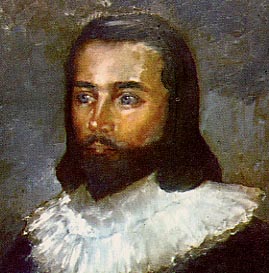 Guy,
John (d. 1628?), founder of a colony at Cupids,
Newfoundland, was a citizen of Bristol and served that city as sheriff (1605-06),
mayor (1618-19), and member of parliament (1620-28). In 1609 he published
an appeal for colonization of Newfoundland, and in the following year James
I granted a charter incorporating and subsidizing the "Company of Adventurers
and Planters of the Cities of London and Bristol" for the purpose of colonizing
the eastern and southern parts of the new found land between 46 and 52 degrees
north latitude. Guy took out a party of thirty-nine settlers in 1610, and
established "Sea
forest plantation" at Cupids. He made a second visit to the island in
1612, but in 1613 returned to England and left the colony to sink or swim.
[Can.
Ency] [DCB]
[website]
[Life
at Cupids in 1611]
Guy,
John (d. 1628?), founder of a colony at Cupids,
Newfoundland, was a citizen of Bristol and served that city as sheriff (1605-06),
mayor (1618-19), and member of parliament (1620-28). In 1609 he published
an appeal for colonization of Newfoundland, and in the following year James
I granted a charter incorporating and subsidizing the "Company of Adventurers
and Planters of the Cities of London and Bristol" for the purpose of colonizing
the eastern and southern parts of the new found land between 46 and 52 degrees
north latitude. Guy took out a party of thirty-nine settlers in 1610, and
established "Sea
forest plantation" at Cupids. He made a second visit to the island in
1612, but in 1613 returned to England and left the colony to sink or swim.
[Can.
Ency] [DCB]
[website]
[Life
at Cupids in 1611]
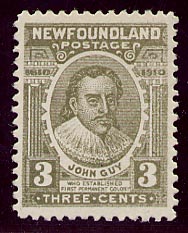
Hamilton, Sir Charles, second Baronet (1767-1849), admiral, was governor of Newfoundland from 1818 to 1824. During his administration there were two destructive fires in St. John's (1818, 1819), and agitation for responsible government was carried on by William Carsonand others. [website] [DCB]
Hamilton, Ker Baillie, governor of Newfoundland (1852-55). He attended the military academy at Woolwich, England, entered the Indian military service in 1822, and subsequently held administrative posts in various parts of the empire. After leaving Newfoundland he was governor of Antigua and the Leeward islands until 1863. [website]
[Hardy, Sir Charles (c. 1714-1780). Naval governor of Newfoundland in 1744. (Newfoundland heritage site)] [DCB]
Harris, Sir Charles Alexander(1855-1947), governor of Newfoundland (1917-22), was born at Wrexham, England, on June 28, 1855. He was educated at Cambridge and studied law at Lincoln's Inn. He entered the colonial office in 1879, served in many capacities, and was chief clerk from 1909 to 1917. He died on March 26, 1947. In 1879 he married Constance Maria Shute (d. 1941) of Clifton, and by her had two sons and one daughter. He was created K.C.M.G. in 1917. [website]
Harvey, Augustus (1839-1903), merchant and statesman, was born on May 31, 1839, in Bermuda. He was educated at the University of Pennsylvania, and was engaged during the greater part of his life in industrial and commercial enterprises in Newfoundland. He was a member of the legislative council for more than twenty years, was minister without portfolio in the Whiteway government, was a member of the delegation on the French treaty question sent to London in 1890, and in 1892 was successful on a special mission to Madrid. He died on February 7, 1903. He married the fifth daughter of George Walker of Lunenburg, Nova Scotia. [DCB] [Biography by Melvin Baker] [Newfoundland politics in the period of 1889-1895] [picture] [Harvey at the Halifax conference of 1892]
[Harvey, Sir John (1778-1852). Civil governor of Newfoundland from 1841 to 1846. (Newfoundland heritage site)] [DCB]
Harvey, Moses (1820-1901) clergyman and historian, was born at Armagh, Ireland, of Scottish descent. He graduated from Royal College, Belfast, and in 1844 was ordained minister of a church at Maryport, Cumberland. In 1852 he came to St. John's, Newfoundland, and for twenty-four years he had charge of Free St. Andrew's Church. He was an advocate of union between the Free and Established branches of the Presbyterian Church, and in 1877 demitted his charge in order to facilitate the union. He was interested in many aspects of life in Newfoundland, and his accomplishments included the discovery, in 1873, of a new species of cuttlefish, Achetenthis Harveyé. His published works include Lectures, literary and biographical (Edinburgh, 1864); This Newfoundland of ours (St. John's, 1878); Across the island with Sir John Glover (St. John's, 1879); Newfoundland, the oldest British colony (London, 1883); Text book of Newfoundland history (Boston, 1885); Where are we and whither tending (London & Boston, 1886); A short history of Newfoundland (London, 1890); and Newfoundland as it is in 1894 (St. John's, 1894). In 1891 he was made a Fellow of the Royal Society of Canada and an LL.D. of McGill University. He died in 1901. [Can. Ency] [DCB] [picture] [His role in the Presbyterian Church of Newfoundland] [Introduction to his works] [Harvey as the Newfoundland correspondent of the Montreal Gazette between 1872 and 1901] [Brief 19th century biography of Harvey] [Harvey on Newfoundland's native people]
Hayman, Robert (d. 1631 ?), epigrammatist, was a native of Devonshire. At Exeter College, Oxford, he acquired some reputation as a poet. and became a B.A. He succeeded John Mason as governor of Guy's colony, and in letters to the King he predicted failure of the colony unless large grants were forthcoming. After returning to England he published, in 1628, in one volume called Quodlibets, four books of translations, epigrams and verse which he had written at Harbour Grace. In 1628 he set out to settle a plantation in Guiana, and is thought to have died there in 1631. See Dictionary of national biography. [biography] [DCB] [Cambridge History of English and American literature]
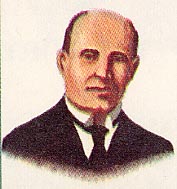 Hickman, Albert Edgar (1875-1943), merchant and politician, was
born at Grand Bank, Newfoundland, on August 2, 1875, the son of Henry Hickman
and Ann Hilliar. He was educated at Mount Allison
University. He was leader of the Liberal party in the House of Assembly
for four years, and for a short time in 1924 was Prime Minister of Newfoundland.
He died on February 9, 1943. In 1906 he married Marie Louise Laurie, of Scotland,
and by her had one son and three daughters. [Can.
Ency] [Newfoundland
in the 1920's]
Hickman, Albert Edgar (1875-1943), merchant and politician, was
born at Grand Bank, Newfoundland, on August 2, 1875, the son of Henry Hickman
and Ann Hilliar. He was educated at Mount Allison
University. He was leader of the Liberal party in the House of Assembly
for four years, and for a short time in 1924 was Prime Minister of Newfoundland.
He died on February 9, 1943. In 1906 he married Marie Louise Laurie, of Scotland,
and by her had one son and three daughters. [Can.
Ency] [Newfoundland
in the 1920's]
[Higgins, Gordon Francis (1905-1957). Of Irish descent and a lawyer for the Newfoundland Seaman's Association, he was elected a delegate to the National Convention. He favoured a return to Responsible Government and opposed union with Canada. He supported the sending of a delegation to Ottawa to negotiate Newfoundland's entry into Confederation although he continued to oppose such a union. He sat in the House of Commons between 1949 and 1953.] [Biography at the Newfoundland Heritage site] [Motion to put Confederation on the ballot] [Picture of the members of the National Convention] [History of the Newfoundland National Convention]
[Higgins, John Gilbert (Jack) (1891-1963). Lawyer, veteran of the First World War, opposed union with Canada, member of the Newfoundland House of Assembly and Leader of the Opposition (1949-1951), senator (1959-1963). (Archival treasures of Memorial University) [His Christmas card collection]
Higgins, William John (1880-1943), lawyer and statesman, was born at St. John's, Newfoundland, on September 4, 1880, the son of James and Margaret Higgins. He studied law in the office of S. Conroy, was called to the bar of Newfoundland in 1910 and was created K.C. in 1918. He was first elected to the assembly for St. John's East in 1913, and. during the next fifteen years served as speaker (1918-19), leader of the opposition (1923-24), minister of justice and attorney general (1924-28). In 1926 he was delegate to the imperial conference, and was also Newfoundland counsel in the Labrador boundary dispute, heard before the Privy Council. In 1928 he was appointed judge of the Supreme court. He died on October 7, 1943. In 1905 he married Mary McGirr of Glasgow, Scotland, and by her had four sons and one daughter. [Role as attorney-general]
Hill, Sir Stephen John (1809-1891), was governor of Newfoundland from 1869 to 1876. He had served previously as governor and commander-in-chief of Gold Coast (1851), colonel of the West India Regiment (1854), lieutenant-governor of Sierra Leone (1854), and governor-in-chief (1860-62), and governor-in-chief of the Leeward and Caribee [sic] islands (1863-69). He was created K.C.M.G. in 1874. [website] [DCB]
[Hill, William (dates unknown) proprietary governor of the Avalon colony between 1634 and 1638. (Newfoundland heritage site)] [DCB]
[Hodgins, William Charles (1903-1982). Chaplain to Newfoundland soldiers in World War II. (Archival treasures of Memorial University)]
Holloway, John (1742-1826), admiral, was governor of Newfoundland from 1807 to 1809. He was born at Wells, Somersetshire, in 1742, entered the navy in 1760, served under Howe on the North American station and under Rodney in the West Indies, became an admiral in 1809, and died at Wells on June 26, 1826. [website] [DCB]
[Holme, Randle Wilson (1864-1957). Failed 1887 expedition to Churchill Falls in the Labrador interior. (Archival treasures of Memorial University)]
Horwood, Sir William Henry (1862-1945), chief justice of Newfoundland (1902-44), was born on November 5, 1862. He was educated at Bishop Feild College, St. John's, and studied law. He was called to the Newfoundland bar in 1885, became a bencher of the Law Society in 1891, and in 1895 was appointed Q.C. He was elected to the assembly in 1894; and for the next fifty years took prominent part in the affairs of the island. He served as Colonial secretary (1894-5), member of the executive council (1894-97 and 1900-02), Minister of Justice and Attorney-general (1900-02), and chief justice. He was a Newfoundland delegate to the Ottawa conference to discuss confederation with Canada in 1895. He was created knight bachelor in 1904, and K.C.M.G. in 1944. He died on April 7, 1945. In 1908 he married Julia (O.B.E. 1941), daughter of the Rev. Geo. Hutchinson.
Howley, James Patrick (1847-1918), geologist and historian, was born in St. John's, Newfoundland, on July 7, 1847, the son of Richard Howley. He was educated at St. Bonaventure's, College. He became assistant geological surveyor in 1867, and in 1887 became director of the survey. He was author of a textbook and several reports on the geology of Newfoundland, and of the standard work on the aborigines of Newfoundland, The Beothuck or Red Indians (Cambridge, 1915). He married Elizabeth Jane Firth. [DCB] [On the Beothuks] [Bibliography on the Beothuks] [Beothuk History and Religion] [Howley's career as one on Newfoundland's most important geologists]
Howley, Michael Francis (1843-1914), archbishop of Newfoundland, was born at St. John's, Newfoundland, in 1843. He was ordained a priest of the Roman Catholic Church in 1868; and in 1894 he was appointed bishop of St. Johns, Newfoundland, and in 1904 first archbishop of Newfoundland. He died at St. John's on October 15, 1914. In 1902 he was elected a fellow of the Royal Society of Canada; and he was the author of an Ecclesiastical History of Newfoundland (Boston, 1888), as well as of several papers contributed to the Transactions of the Royal Society of Canada, and some poetry. [DCB] [picture]
Howley, Richard Vincent (1836-1912), priest, was born in St. John's, Newfoundland, in August, 1836. He was the fourth son of Richard Howley, merchant, and was brother to James Patrick Howley and Michael Francis Howley. He was educated at All-Hallows College, Dublin, and College of Propaganda, Rome, where he became a D.D. He taught for several years at All-Hallows College, and in 1863 returned to Newfoundland to become a professor and later vice-president of St. Bonaventure's College. He died in September 1912, at Albany, New York. His articles and poems appeared in various American and English magazines. See Richard Vincent Howley, D.D. (Newfoundland Quarterly, 1912).
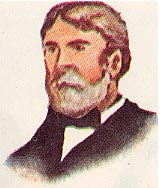 Hoyles,
Sir Hugh William (1815-1888), lawyer, Prime Minister of Newfoundland (1861-65); was born in St.
John's in 1815, son of Newman Hoyles. He was educated at Pictou Academy,
Nova Scotia, studied law, and in 1846 became solicitor to the Newfoundland
House of Assembly. From 1848 to 1859 he represented Fortune
in the [House of Assembly], and as leader of the Conservative party became
Prime Minister when the Kent
ministry was dismissed in 1861. His party was returned in the election that
followed, and the opening of the session on May 13, 1861, was marked by rioting
in St. John's. He was Prime Minister and Attorney-general until 1865,
when he became Chief Justice. He retired in 1880, and died in Halifax, Nova
Scotia, on February 1, 1888. See E. B. Foran, Newfoundland statesmen of
the past in J. R. Smallwood (ed.), Book of Newfoundland (St. John's,
1937). [Can.
Ency] [DCB]
Hoyles,
Sir Hugh William (1815-1888), lawyer, Prime Minister of Newfoundland (1861-65); was born in St.
John's in 1815, son of Newman Hoyles. He was educated at Pictou Academy,
Nova Scotia, studied law, and in 1846 became solicitor to the Newfoundland
House of Assembly. From 1848 to 1859 he represented Fortune
in the [House of Assembly], and as leader of the Conservative party became
Prime Minister when the Kent
ministry was dismissed in 1861. His party was returned in the election that
followed, and the opening of the session on May 13, 1861, was marked by rioting
in St. John's. He was Prime Minister and Attorney-general until 1865,
when he became Chief Justice. He retired in 1880, and died in Halifax, Nova
Scotia, on February 1, 1888. See E. B. Foran, Newfoundland statesmen of
the past in J. R. Smallwood (ed.), Book of Newfoundland (St. John's,
1937). [Can.
Ency] [DCB]
[Job, Robert Brown (1873-1961). Businessman, politician and economic unionist. (Archival treasures of Memorial University)]
[Johnson, Sybil (1887-1973). Nurse in the Volunteer Aid Detachment of Newfoundland in World War I. (Archival treasures of Memorial University)]
Jones, John (fl. 1775), a former artillery sergeant; was the first Congregational minister in Newfoundland. [DCB] [Journal of John Jones of the Congregational Church of St. John's] [History of the Congregational Church of Newfoundland] [Jones' last will and testament] [Congregationalism in Newfoundland]
Jones, Llewellyn (1840-1918), fourth Anglican bishop of Newfoundland (1878-1917), was born in Liverpool on October 11, 1840, son of Edward Jones and Harriet Paton. He was educated at Harrow, Cambridge (M.A., 1866), and at Wells Theological College. He had been rector of Little Hereford for four years when he was appointed to the bishopric of Newfoundland in 1878. In St. John's, he supervised the completion of the Cathedral, which had been started by Bishop Feild, and supervised its restoration after the fire of 1892. He resigned, with failing health, on July 8, 1917, and died January 9, 1918. In 1881 he married Elizabeth Alice, second daughter of Sir Adam G. Archibald, by whom he had two sons and one daughter. In 1905 he was made a D.D. of King's College, Windsor, Nova Scotia. See C. H. Mockridge, The bishops of the Church of England in Canada and Newfoundland (Toronto,1896). [His last will and testament] [Brief biography]
Jukes, Joseph Beete (1811-69), geologist, conducted the first geological survey of Newfoundland in 1839 and 1840. He served later as naturalist in the Australian survey, and from 1850 to 1869 was director of the Irish survey. His published works include Report on the geology of Newfoundland (St. John's, 1839) and Excursions in and about Newfoundland (London, 1842). For a fuller account of his life, see Dictionary of national biography. [Can. Ency] [DCB] [picture] [Biography] [Letters pertaining to his post-Newfoundland career] [Jukes on Outports, 1840] [On the history of the geological survey of Newfoundland, consult this page]
Source: For material that is not between brackets [.], W. Stewart WALLACE, ed., The Encyclopedia of Canada. Newfoundland Supplement, Toronto, University Associates of Canada, 1949, 104p. Weblinks have been added to the text.
© 2004 Claude Bélanger, Marianopolis College |